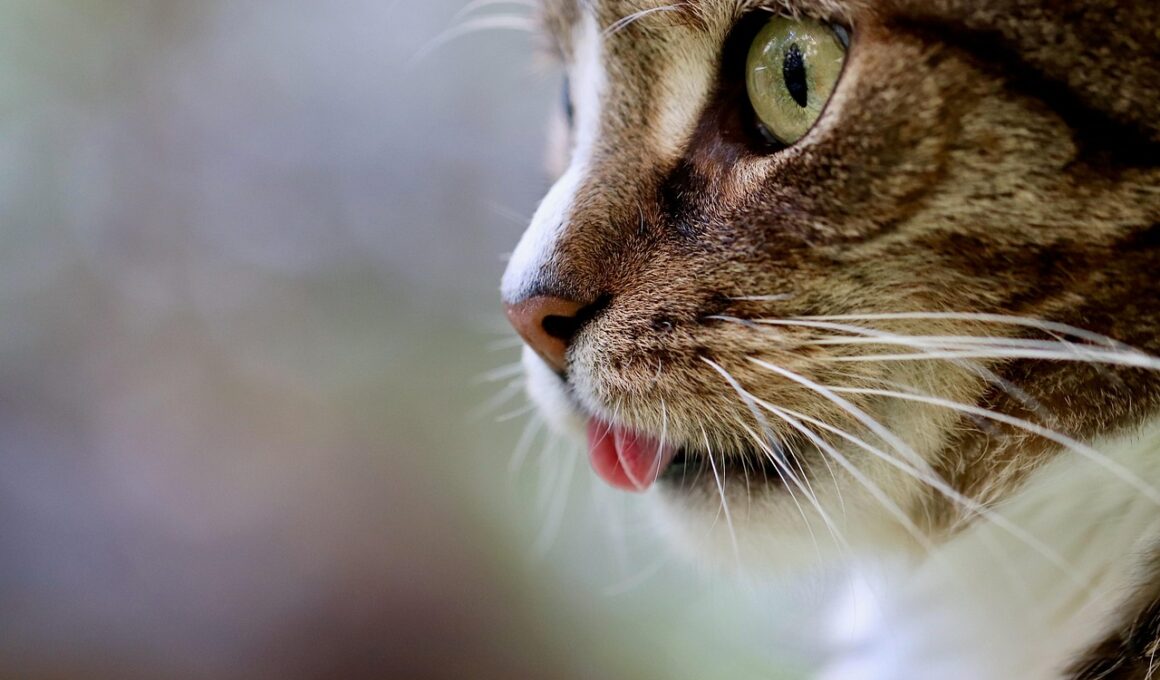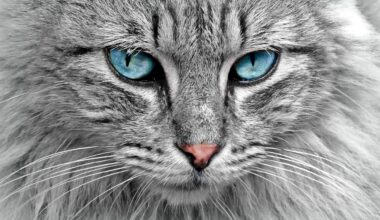Diet and Care Tips Before Your Cat’s Vaccination Appointment
Preparing your cat for a vaccination requires careful attention to its diet and overall wellbeing. Initially, ensure that your cat has a consistent feeding schedule. A well-timed meal, ideally a few hours before the appointment, can help reduce stress and anxiety in your feline friend. It is also crucial to provide high-quality nutrition. Opt for premium cat foods that meet their specific dietary needs. A balanced diet, rich in proteins and essential nutrients, builds their immunity and supports recovery post-vaccination. Furthermore, consider the timing of meals; if your cat tends to experience motion sickness when traveling, give them a light meal. Avoid overfeeding, as a full stomach can lead to discomfort. Additionally, keep fresh water available. Proper hydration before their visit contributes to overall health, making the vaccination process smoother. In addition, monitor food intake in the days leading up to the appointment. If you notice any unusual changes in appetite, consult your veterinarian. Lastly, don’t hesitate to bring your cat’s favorite treats to create a calming environment during this important visit.
The Importance of Preparation
Preparing your cat ahead of time can significantly enhance the vaccination experience. Stress can affect a cat’s immune response, so keeping your environment calm is essential. Familiarize your cat with the carrier ahead of the appointment. Place the carrier in a comfortable spot in your home, allowing your cat to explore it naturally. Encourage positive associations by using treats or toys inside the carrier. Handling your cat gently when it’s time to travel will also help alleviate anxiety. Cover the carrier with a light blanket or cloth to help create a secure environment during travel. Additionally, consider playing calming music or using pheromone sprays in the carrier to promote relaxation. Arrive at the veterinary clinic early to avoid rushing; this will help both you and your cat adjust to the surroundings. When inside, speak softly to your cat while waiting for the appointment. If your cat becomes overly anxious or fearful, it may be beneficial to seek the advice of your veterinarian regarding anxiety-reducing options. These measures can ensure your cat remains calm and cooperative throughout the process.
Ensure that your cat’s health history is readily accessible. Recording details like previous vaccinations, any adverse reactions, and underlying health conditions will aid the veterinarian in providing tailored care. Additionally, consider a physical check-up days before the vaccination. Look for any signs of illness or discomfort which should be discussed with the vet. This proactive approach can help avoid complications during or after the vaccination. Moreover, it’s wise to familiarize yourself with the types of vaccinations your cat is due for. Talk to your vet about the core vaccines recommended for your area. Having clarity on what to expect can reduce anxiety about the visit. Prepare for potential side effects that may occur, such as mild fever or lethargy following vaccination. Understanding these aspects also helps you care for your cat during the recovery phase. Lastly, don’t neglect your cat’s hygiene. A thorough grooming session before the appointment will reduce fur loss and contribute to their overall comfort. A well-groomed cat is more likely to enjoy their visit to the vet and behave positively during the vaccination.
Incorporating a positive reinforcement approach can greatly influence your cat’s experience. Reward your cat with praise and treats after each phase of preparation, from getting into the carrier to within the veterinary clinic. This can positively condition your cat’s perception of both the carrier and the clinic itself. It’s essential to maintain a calm demeanor during preparation and travel, as cats can pick up on human emotions. Encouraging playtime and interaction at home can serve as a distraction from the upcoming visit, easing any anxiety. Offering favorite toys or treats specifically for this occasion can strengthen positive associations. Keep in mind that cats thrive on routine. Keeping their daily schedule consistent helps them feel secure. However, introduce changes gradually, allowing them to adjust to new experiences. If you foresee travel anxiety, discuss this with your veterinarian, who may offer advice or resources. On the day of vaccination, involve your cat in a light play session, elevating their mood and energy. This practice helps maintain a balanced emotional state and prepares your cat for an easier travel experience to the vet.
Consider reviewing vaccination guidelines. Regular check-ups are essential to maintaining your cat’s health. It helps to stay informed regarding schedules and types of vaccines necessary at different life stages. Work with your veterinarian to establish a vaccination timeline that aligns with your cat’s health condition and lifestyle. Discuss specific recommendations for indoor versus outdoor cats, as they might differ significantly. Paying attention to regional factors, such as prevalent diseases, is equally important. Contact your vet if any changes occur in your cat’s behavior or health status before the appointment. Early detection of any issues can prevent complications during vaccination. Additionally, educate yourself on the potential side effects of vaccines. While most cats experience minimal reactions, understanding possible symptoms such as swelling or lethargy post-vaccination allows you to monitor your cat’s wellbeing efficiently. Prepare for follow-up appointments based on your veterinarian’s guidance, ensuring ongoing health assessments. Lastly, documenting your cat’s response over time assists your vet in making informed decisions in the future. Your attention and preparedness facilitate a smooth vaccination experience and contribute to your cat’s ongoing health.
Consider the timing of your appointment. Schedule vaccinations when you can dedicate time to care for your cat afterwards. Avoid weekends or holidays if you suspect your cat will need extra attention post-visit. Post-vaccination, ensure your cat has a comfortable and quiet space to rest. This helps them adjust and recover. If you’re facing difficulties during your visit, don’t hesitate to communicate openly with your veterinary staff. They can provide strategies to help you and your cat feel more comfortable. Dealing with a fidgety cat can be challenging, so human guidance is essential. Additionally, stay updated on local vaccination clinics as they may occasionally offer discounts or community outreach programs. This can ease the financial burden while ensuring your cat is up-to-date on necessary vaccinations. Lastly, never hesitate to express your concerns or ask questions regarding your cat’s vaccinations. Open communication fosters a better veterinarian-client relationship and enhances your understanding of your cat’s health needs. A well-informed owner can better advocate for their pet, ensuring a positive experience at every visit.
To ensure comprehensive care, incorporate proper socialization techniques into your preparation. Familiarize your cat with various environments and people when possible. Gradually introduce them to small car rides or trips to the vet to reduce fear or anxiety. Socialization benefits cats significantly, especially those who may have had limited exposure. Creating a positive reinforcement strategy is invaluable during this time. Implementing rewards—both verbal and treats—while exploring new situations will reinforce positive behaviors. Furthermore, monitor your cat closely for fears or apprehensions that arise during this process, which can be addressed and modified. Additionally, dedicate time to observe your cat’s unique behavior and preferences. This can enable you to adjust your strategies for traveling, handling, or even relaxing effectively. Remember that some cats may need more time than others to adapt. Patience is vital in these situations. Always celebrate small successes along the way. Lastly, build a strong bond of trust between you and your companion, enriching your relationship through consistent care and attention. Preparing your cat for their vaccination is a journey that goes beyond mere health; it explores every facet of your cat’s well-being and comfort.
Taking the time to prepare for your cat’s vaccination appointment can make a world of difference. Being proactive, understanding their needs, and ensuring their comfort will contribute significantly to a seamless experience. Collaborating with your veterinarian and keeping open lines of communication allows you to tailor the experience specifically to your cat. Ultimately, it is your love and dedication that create a nurturing environment where your cat can thrive. By following these tips, you promote not only a positive vaccination experience but also a strong, lasting relationship with your feline friend.


